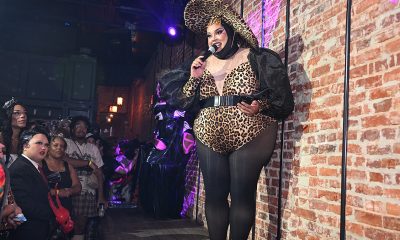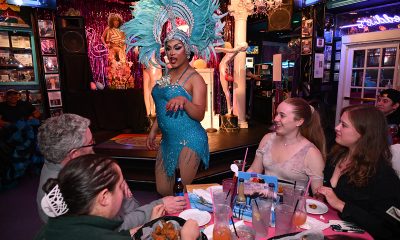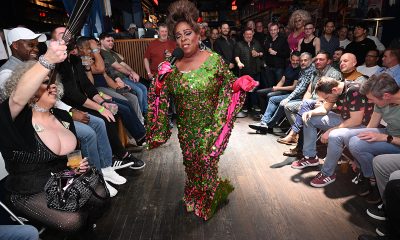Local
Heroic distinction ‘very humbling’
Capital Pride honors locals working to help others
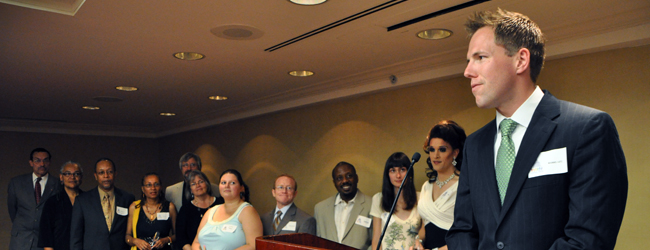
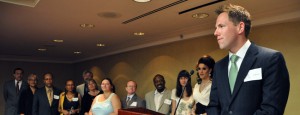
The Capital Pride heroes are honored in advance of this year's festival. (Washington Blade photo by Michael Key)
This year’s Capital Pride Heroes include four individuals and two organizations. Meet the heroes below.
MARTA ALVARADO
Latina and LGBT rights advocate Marta Alvarado leads the annual “Creating Change” conference, an important contribution to advancing the cause of LGBT rights.
Alvarado, whose National Gay and Lesbian Task Force job title of program coordinator for movement building barely hints at the array of skills she brings to getting all those cantankerous ducks in a row for five days of intensive movement-building, which she calls “the largest gathering of LGBT people and their allies.” It’s an exercise requiring equal parts precision and empathy.
Next year’s “Creating Change” conference — February 2-6 in Minneapolis — is expected to draw 2,000-3,000 people, she says. The year after that she will bring the conference to Baltimore.
For Alvarado, the Capital Pride Hero award is “a big honor … I had to take a step back, and receiving it takes me back to age 15 to my very first Pride event, and now it’s 15 years later, and I know the significance of Pride, and it’s very humbling.”
DESTINY B. CHILDS
How many ways are there to be dazzled by Destiny B. Childs?
Her list of titles as female impersonator and lady-illusionist are legendary, including her newest title of Miss Capital Pride 2010, the award she just won in a June 4 competition with seven other contestants at Town Danceboutique to kick off Capital Pride’s schedule. As such, she will preside over the parade on Saturday evening and the festival on Sunday.
Also known as Richard Legg, a 32-year-old government contracting specialist during the day, Destiny will be married on Aug. 28 in D.C. to her beloved, Rudy Benavides. With her theme song by Diana DeGarmo of “I Believe” and her special motto of “defy gravity,” Destiny has been doing drag for seven years in D.C.
Born in Albuquerque, Legg entered the Army and then completed his undergraduate education with a bachelor’s in health care management from Southern Illinois University in 2005. In D.C., he has been the featured entertainer at Freddie’s Beach Bar for six years and also a member of the Ladies of Illusion at Ziegfeld’s.
REV. ELDER DARLENE GARNER
Garner, the mother of four, grandmother of seven and great-grandmother of three, is a warrior of the spirit. She was born in Columbus, Ohio but after her divorce in 1973 she moved to D.C. to take a job as an administrative assistant at the World Bank.
Raised in the National Baptist Church, in 1976 she joined the still relatively new Metropolitan Community Church, where she is now an ordained minister and member of the MCC Board of Elders. She leads the MCC Conference for African-American Leaders and has also worked as executive director of the Philadelphia Mayor’s Commission on Sexual Minorities and previously as chaplain for an AIDS hospice and as board president for the Northern Virginia AIDS Ministry. She also helped to found the National Coalition of Black Lesbians and Gays.
On March 9, she and her partner of many years, Rev. Candy Holmes, were married along with two other couples in the first ceremony under D.C.’s new same-sex marriage law.
DC CLERGY UNITED FOR MARRIAGE EQUALITY
This diverse group of more than 200 “affirming and welcoming” clergy, representing religious institutions in every ward of the District, pushed back with robust fortitude and biblical testimony against the dogmatic naysayers from the homophobic corners of religious life.
“We are the District of Columbia clergy and religious leaders of many faiths, races, ethnicities, and sexual orientations,” they declared in a statement full of eloquent yet simple profundity: “We now join our voices again to speak a faithful word for freedom and equality.”
“We declare that our faith calls for us to affirm marriage equality for loving same-sex couples,” because “where love is present, God is also present,” and “it is holy and good.”
These clergy fought the “battle of Jericho” in D.C. and the walls came tumbling down.
DC FOR MARRIAGE
A program of the DC Center, this group of local residents became activists pushing politically every inch of the way to win votes on the D.C. Council in favor of this historic step. And the organization continues its important work today, for example in offering legal updates for D.C. residents on creating legal protections for “families of choice” brought together under the new marriage law. See more information on their ongoing work at www.dcformarriage.org.
Virginia
McPike wins special election for Va. House of Delegates
Gay Alexandria City Council member becomes 8th LGBTQ member of legislature

Gay Alexandria City Council member Kirk McPike emerged as the decisive winner in a Feb. 10 special election for a seat in the Virginia House of Delegates representing Alexandria.
McPike, a Democrat, received 81.5 percent of the vote in his race against Republican Mason Butler, according to the local publication ALX Now.
He first won election to the Alexandria Council in 2021. He will be filling the House of Delegates seat being vacated by Del. Elizabeth Bennett-Parker (D-Alexandria), who won in another Feb. 10 special election for the Virginia State Senate seat being vacated by gay Sen. Adam Ebbin (D-Alexandria).
Ebbin is resigning from his Senate next week to take a position with Virginia Gov. Abigail Spanberger’s administration.
Upon taking his 5th District seat in the House of Delegate, McPike will become the eighth out LGBTQ member of the Virginia General Assembly. Among those he will be joining is Sen. Danica Roem (D-Manassas), who became the Virginia Legislature’s first transgender member when she won election to the House of Delegates in 2017 before being elected to the Senate in 2023.
“I look forward to continuing to work to address our housing crisis, the challenge of climate change, and the damaging impacts of the Trump administration on the immigrant families, LGBTQ+ Virginians, and federal employees who call Alexandria home,” McPike said in a statement after winning the Democratic nomination for the seat in a special primary held on Jan. 20.
McPike, a longtime LGBTQ rights advocate, has served for the past 13 years as chief of staff for gay U.S. Rep. Mark Takano (D-Calif.) and has remained in that position during his tenure on the Alexandria Council. He said he will resign from that position before taking office in the House of Delegates.
Local
Local LGBTQ groups, activists to commemorate Black History Month
Rayceen Pendarvis to moderate Dupont Underground panel on Sunday
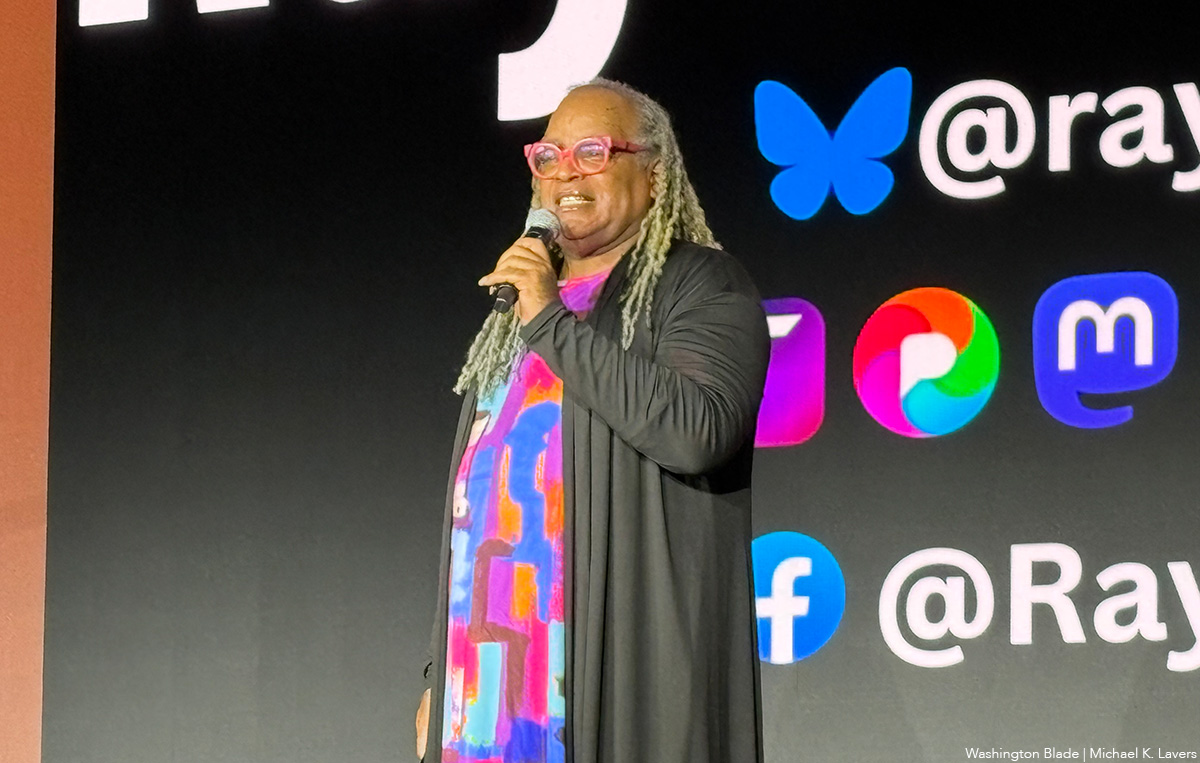
LGBTQ groups in D.C. and elsewhere plan to use Black History Month as an opportunity to commemorate and celebrate Black lives and experiences.
Team Rayceen Productions has no specific events planned, but co-founder Rayceen Pendarvis will attend many functions around D.C. this month.
Pendarvis, a longtime voice in the LGBTQ community in D.C. moderated a panel at Dupont Underground on Feb. 8. The event, “Every (Body) Wants to Be a Showgirl,” will feature art from Black burlesque artists from around the country. Pendarvis on Feb. 23 will attend the showing of multimedia play at the Lincoln Theatre that commemorates the life of James Baldwin.
Equality Virginia plans to prioritize Black voices through a weekly online series, and community-based story telling. The online digital series will center Black LGBTQ voices, specifically trailblazers and activists, and contemporary Black queer and transgender people.
Narissa Rahaman, Equality Virginia’s executive director, stressed the importance of the Black queer community to the overall Pride movement, and said “Equality Virginia is proud to center those voices in our work this month and beyond.”
The Capital Pride Alliance, which hosts Pride events in D.C., has an alliance with the Center for Black Equity, which brings Black Pride to D.C. over Memorial Day weekend. The National LGBTQ Task Force has no specific Black History Month events planned, but plans to participate in online collaborations.
Cathy Renna, the Task Force’s director of communications, told the Washington Blade the organization remains committed to uplifting Black voices. “Our priority is keeping this at the forefront everyday,” she said.
The D.C. LGBTQ+ Community Center is also hosting a series of Black History Month events.
The D.C. Public Library earlier this year launched “Freedom and Resistance,” an exhibition that celebrates Black History Month and Martin Luther King Jr. It will remain on display until the middle of March at the Martin Luther King Jr. Memorial Library at 901 G St., N.W.
District of Columbia
U.S. Attorney’s Office drops hate crime charge in anti-gay assault
Case remains under investigation and ‘further charges’ could come

D.C. police announced on Feb. 9 that they had arrested two days earlier on Feb. 7 a Germantown, Md., man on a charge of simple assault with a hate crime designation after the man allegedly assaulted a gay man at 14th and Q Streets, N.W., while using “homophobic slurs.”
But D.C. Superior Court records show that prosecutors with the Office of the U.S. Attorney for D.C., which prosecutes D.C. violent crime cases, charged the arrested man only with simple assault without a hate crime designation.
In response to a request by the Washington Blade for the reason why the hate crime designation was dropped, a spokesperson for the U.S. Attorney’s office provided this response: “We continue to investigate this matter and make no mistake: should the evidence call for further charges, we will not hesitate to charge them.”
In a statement announcing the arrest in this case, D.C. police stated, “On Saturday, February 7, 2026, at approximately 7:45 p.m. the victim and suspect were in the 1500 block of 14th Street, Northwest. The suspect requested a ‘high five’ from the victim. The victim declined and continued walking,” the statement says.
“The suspect assaulted the victim and used homophobic slurs,” the police statement continues. “The suspect was apprehended by responding officers.”
It adds that 26-year-old Dean Edmundson of Germantown, Md. “was arrested and charged with Simple Assault (Hate/Bias).” The statement also adds, “A designation as a hate crime by MPD does not mean that prosecutors will prosecute it as a hate crime.”
Under D.C.’s Bias Related Crime Act of 1989, penalties for crimes motivated by prejudice against individuals based on race, religion, sexual orientation, gender identity, disability, and homelessness can be enhanced by a court upon conviction by one and a half times greater than the penalty of the underlying crime.
Prosecutors in the past both in D.C. and other states have said they sometimes decide not to include a hate crime designation in assault cases if they don’t think the evidence is sufficient to obtain a conviction by a jury. In some instances, prosecutors have said they were concerned that a skeptical jury might decide to find a defendant not guilty of the underlying assault charge if they did not believe a motive of hate was involved.
A more detailed arrest affidavit filed by D.C. police in Superior Court appears to support the charge of a hate crime designation.
“The victim stated that they refused to High-Five Defendant Edmondson, which, upon that happening, Defendant Edmondson started walking behind both the victim and witness, calling the victim, “bald, ugly, and gay,” the arrest affidavit states.
“The victim stated that upon being called that, Defendant Edmundson pushed the victim with both hands, shoving them, causing the victim to feel the force of the push,” the affidavit continues. “The victim stated that they felt offended and that they were also gay,” it says.

